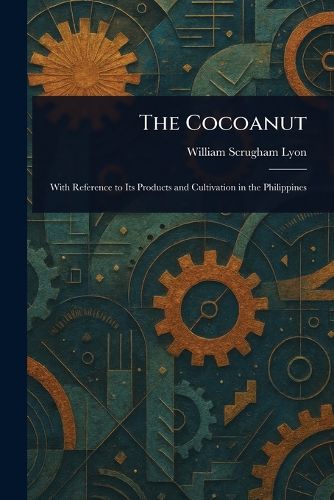Readings Newsletter
Become a Readings Member to make your shopping experience even easier.
Sign in or sign up for free!
You’re not far away from qualifying for FREE standard shipping within Australia
You’ve qualified for FREE standard shipping within Australia
The cart is loading…






This title is printed to order. This book may have been self-published. If so, we cannot guarantee the quality of the content. In the main most books will have gone through the editing process however some may not. We therefore suggest that you be aware of this before ordering this book. If in doubt check either the author or publisher’s details as we are unable to accept any returns unless they are faulty. Please contact us if you have any questions.
Delve into the world of tropical agriculture with William S. Lyon's "The Cocoanut," a comprehensive exploration of coconut cultivation and its diverse products in the Philippines. This meticulously prepared print edition offers a detailed look at the historical significance of coconuts and their role in the region's economy.
Learn about the intricacies of coconut cultivation, from planting techniques to harvesting methods, and discover the myriad uses of this versatile fruit. "The Cocoanut" examines the various coconut products and their importance to the agribusiness industry in the Philippines.
A valuable resource for those interested in tropical agriculture, botany, and the economic impact of this vital crop. Explore the timeless appeal of "The Cocoanut" and gain a deeper understanding of the enduring legacy of coconut cultivation.
This work has been selected by scholars as being culturally important, and is part of the knowledge base of civilization as we know it.
This work is in the public domain in the United States of America, and possibly other nations. Within the United States, you may freely copy and distribute this work, as no entity (individual or corporate) has a copyright on the body of the work.
Scholars believe, and we concur, that this work is important enough to be preserved, reproduced, and made generally available to the public. We appreciate your support of the preservation process, and thank you for being an important part of keeping this knowledge alive and relevant.
$9.00 standard shipping within Australia
FREE standard shipping within Australia for orders over $100.00
Express & International shipping calculated at checkout
Stock availability can be subject to change without notice. We recommend calling the shop or contacting our online team to check availability of low stock items. Please see our Shopping Online page for more details.
This title is printed to order. This book may have been self-published. If so, we cannot guarantee the quality of the content. In the main most books will have gone through the editing process however some may not. We therefore suggest that you be aware of this before ordering this book. If in doubt check either the author or publisher’s details as we are unable to accept any returns unless they are faulty. Please contact us if you have any questions.
Delve into the world of tropical agriculture with William S. Lyon's "The Cocoanut," a comprehensive exploration of coconut cultivation and its diverse products in the Philippines. This meticulously prepared print edition offers a detailed look at the historical significance of coconuts and their role in the region's economy.
Learn about the intricacies of coconut cultivation, from planting techniques to harvesting methods, and discover the myriad uses of this versatile fruit. "The Cocoanut" examines the various coconut products and their importance to the agribusiness industry in the Philippines.
A valuable resource for those interested in tropical agriculture, botany, and the economic impact of this vital crop. Explore the timeless appeal of "The Cocoanut" and gain a deeper understanding of the enduring legacy of coconut cultivation.
This work has been selected by scholars as being culturally important, and is part of the knowledge base of civilization as we know it.
This work is in the public domain in the United States of America, and possibly other nations. Within the United States, you may freely copy and distribute this work, as no entity (individual or corporate) has a copyright on the body of the work.
Scholars believe, and we concur, that this work is important enough to be preserved, reproduced, and made generally available to the public. We appreciate your support of the preservation process, and thank you for being an important part of keeping this knowledge alive and relevant.